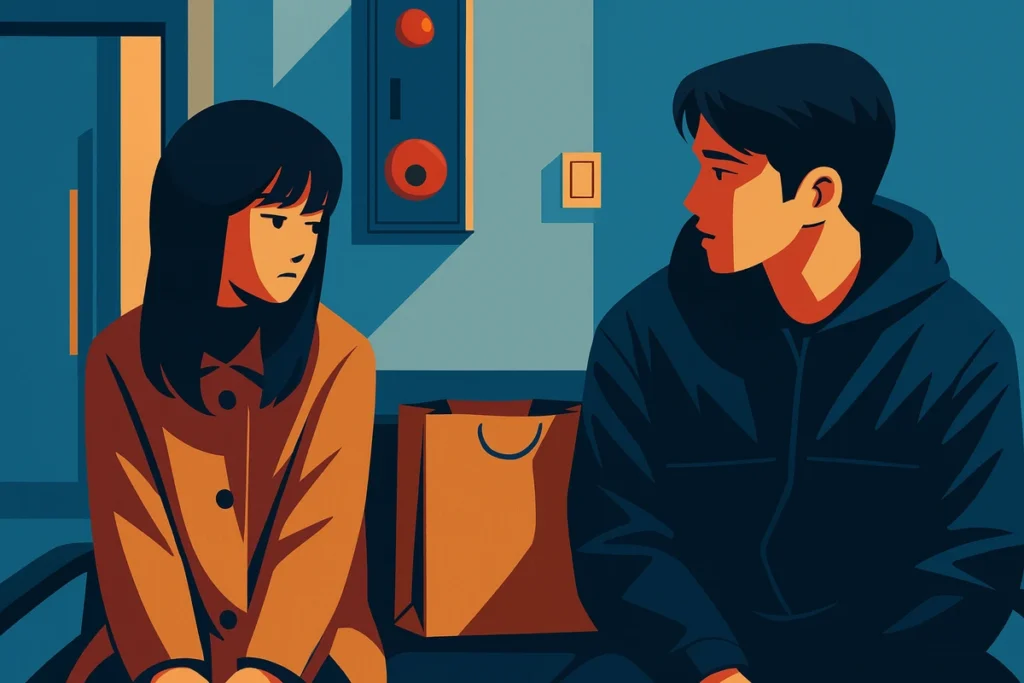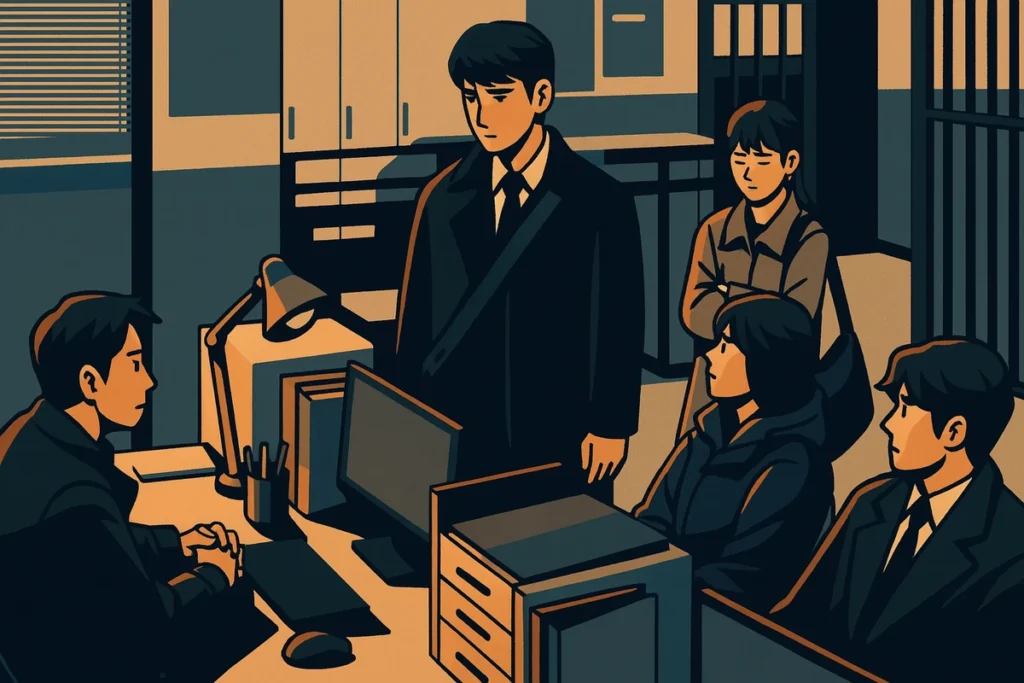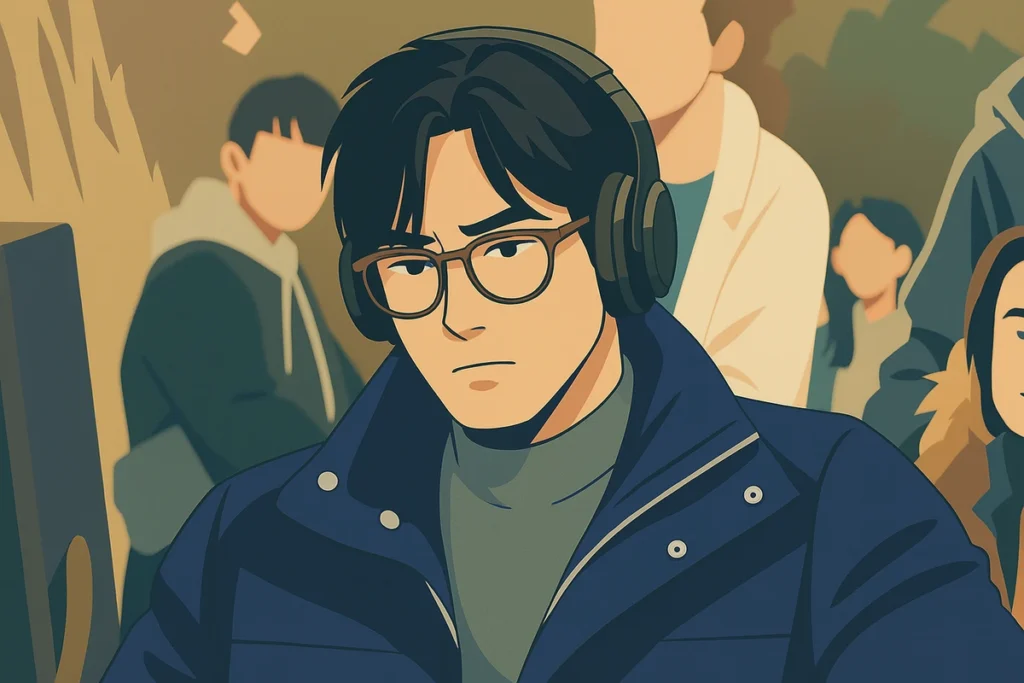[Image Source] AI illustration by DALL·E
TL;DR – Sarcasm, awkwardness, and flirtation.
This early-morning date scene from Our Unwritten Seoul captures the tension of two long-time friends stepping into romance. Through playful jabs and exaggerated honorifics, they navigate the shift from casual to intimate.
Learn how phrases like “돌아보시죠?” and “전세 냈다” playfully mix sarcasm and affection—and how metaphors like “브레이크 걸다” express emotional pacing.
A perfect example of how modern Korean mixes wit, heart, and grammar in everyday moments.
📢 To protect copyright, all dialogue has been rephrased while preserving the original context. I appreciate your understanding.
1. Scene Snapshot
In this playful yet emotionally loaded moment, Mi-ji and Ho-su take their first walk as maybe-something-more-than-friends.
The setting: a nearly empty underground mall that feels like it belongs only to them.
Her teasing tone collides with his quiet sincerity.
It’s not just about steps—it’s about pacing emotions, testing the waters, and finding rhythm together.
📺 Watch the original scene here
[Source] YouTube, 샾잉
Location: Empty underground shopping mall in the morning
Tone: Playful banter → concern → budding affection
Context: Mi-ji worries that Ho-su (injured in a childhood car accident) might be tired, even though he insists he’s fine. The dialogue shifts from teasing to tenderness.
2. Micro-Dialogue
2-1. “저기, 얼굴 좀 보여주실래요?”
→ “Hey, mind showing me your face?”
2-2. “이 정도면 우리가 빌린 거나 다름없지.”
→ “This place is basically ours, huh?”
2-3. “아무 생각 없이 걷고 있었네.”
→ “I was walking without even realizing.”
2-4. “이쯤에서 브레이크 좀 걸어야지.”
→ “Might be time to tap the brakes.”
2-5. “가고 싶은 만큼만 걷자.”
→ “Let’s just walk as much as you feel like.”
3. Culture & Subtext
– Honorific sarcasm like “보여주실래요?” can sound like mock-politeness—flirtation in disguise.
– The “this place is ours” remark echoes 전세 문화, a deep Korean sense of spatial ownership.
– “브레이크 걸다” metaphorically signals emotional pacing—a soft way to check boundaries.
– 반말 shows emotional closeness, but note how they still tread carefully. It’s new territory.
– “걷자” is gentle consent. She gives him control, showing care without losing playfulness.
❓ FAQ (Frequently Asked Questions)
Q1. What does “전세 냈다” imply in casual conversation?
It jokingly means “we’ve got the place all to ourselves.” It uses housing culture as a metaphor for romantic exclusivity.
Q2. Why use honorifics sarcastically like “보여주실래요?”
It’s playful mock-politeness, often used in Korean flirting or close friendships where roles are exaggerated for humor.
Q3. Can “브레이크 걸다” be used outside of driving?
Yes—Koreans use it metaphorically in relationships, emotions, or decision-making. It means to pause, slow down, or reconsider.
Q4. Why does 반말 matter in this scene?
It shows closeness. Moving from 존댓말 to 반말 in Korean is an emotional step—signaling intimacy, trust, or romantic interest.
Q5. Are these expressions safe to use in real life?
Yes, especially among peers or friends. Just remember that honorific sarcasm can backfire if the relationship isn’t that close yet.
4. Grammatical Analysis of the Dialogue
5. Natural Korean Toolkit
📌 Expression Variations
. “보여주실래요?” → “보여줄 수 있어요?” (“Can you show me?” – softer, less playful), “얼굴 좀 보여줘.” (“Show me your face.” – casual and direct)
. “전세 낸 거나 다름없다” → “우리밖에 없네.” (“There’s no one else here.”), “완전 비었네.” (“It’s completely empty.”)
. “생각 없이 걷다” → “무심코 걷다” (“Walk without thinking”), “멍하니 걷다” (“Walk blankly, spaced out”)
. “브레이크 걸다” → “속도를 줄이다” (“Slow down”), “제동을 걸다” (“Apply a brake” – more formal/literal)
. “가고 싶은 만큼만” → “편한 만큼만” (“As much as you’re comfortable with”), “원하는 만큼만” (“Only as much as you want”)
💬 Speech Style Shift
. Formal → “보여주실 수 있으신가요?”, “전세를 낸 느낌입니다.”
. Casual → “보여줘.”, “우리밖에 없잖아.”
. Playful → “고갤 좀 비춰주시죠?”, “완전 전용 데이트 코스네~”
🐾 Omission Patterns
. “(내가) 생각 없이 걷고 있었네.” → Subject dropped
. “(여기) 전세 낸 거나 다름없지.” → Location dropped
🧭 Honorifics & Register
. “보여주실래요?” uses honorifics + playful tone
. “걷자” is a soft, casual suggestion
. “걸어야지” implies self-regulation, not instruction
6. Quick Quiz or Expression Drill
Q1. Which phrase means “to apply emotional brakes” in a figurative way?
A. 제동을 멈추다 B. 브레이크를 걸다 C. 걷고 싶은 만큼 걷자 D. 전세를 내다
Q2. Fill in the blank: “저기, ___ 좀 보여주실래요?” (Hint: You’re teasing someone politely.)
Q3. Translate into Korean: “Let’s just walk as much as you want.”
Q4. Which expression implies playful ownership of space?
A. 이쯤에서 브레이크 좀 걸어야지 B. 아무 생각 없이 걷고 있었네 C. 전세 낸 거나 다름없지 D. 보여줄 수 있어요?
Q5. Rephrase this politely: “보여줘.” → ________
Appendix. Answers
Q1. Answer: B
Q2. Answer: 얼굴 → Full sentence: “얼굴 좀 보여주실래요?” (“Would you mind showing me your face?”)
Q3. Answer: 가고 싶은 만큼만 걷자.
Q4. Answer: C
Q5. Answer: 보여주실래요?
📍 Want More Like This?
Explore more posts in our K-Drama Bites to dive deeper into how Korean dramas reflect emotional nuance, legal speech, and cultural change.
- 🔖 Mastering Korean Honorifics: A Guide to Respectful Communication in Korean Culture
- 🔖 Korean Honorifics vs. Informal Speech: Master the Basics with Practical Examples
🎥 Want more about this drama’s language and themes?
Explore more posts in our K-Drama Bites series and learn how Korean drama lines reveal everyday emotion, grammar, and cultural nuance.
- 🔖 Learn Legal Korean from K-Drama: What “I Won’t Withdraw” Really Means in ‘Our Unwritten Seoul’
- 🔖 Learn Korean with an Ordinary Scene from Our Unwritten Seoul
- 🔖 Learn Korean with a Morning Panic Scene from ‘Our Unwritten Seoul’
- 🔖 Learn Korean with a Public Confrontation: Mistaken Identity and Sarcasm in “Our Unwritten Seoul”
- 🔖 Twin Identity & Korean Phrases: Language Lessons from Our Unwritten Seoul Shorts


